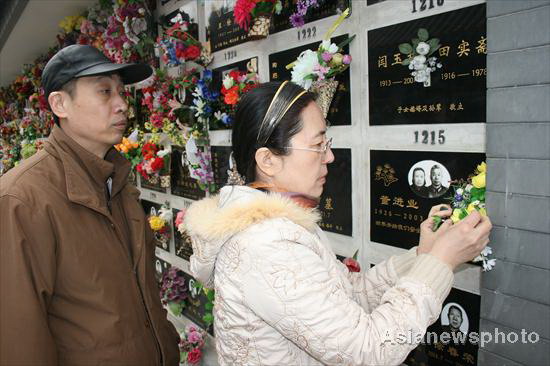Web Exclusive
Rent in peace at China's cemeteries
By Zuo Likun (chinadaily.com.cn)
Updated: 2011-04-02 07:11
 |
Large Medium Small |
Greed Meets Ignorance at Graveyard
But not everybody thinks such a rosy balance sheet is good news. After all, the cemetery is no conventional market.
"It is a place for solace and memory," said Yang, the Beijing professor, who is also a main contributor to the China funeral report.
He pointed out that since funeral ceremonies are connected to personal feeling and can't be tagged with a fixed price, the government should take actions to make sure that bereaved relatives won't be milked for their humanity.
The warning is not unwarranted. In December 2009, the Civil Affairs Ministry, in response to spreading market speculation and scams involving cemetery plots, issued a lengthy tough-worded directive to local bureaus, urging stringent measures to crack down on such shady activities.
A ready example is the notorious Sanhe cemetery in North China's Hebei province.
According to Beijing News' muckraking report in 2006, in the four years up to 2001, over 11,000 people laid out their life savings and even pension money for cemetery plots in Sanhe city, snapping up 45,000 urn pagodas that were said to be certain to rise in value. The Sanhe cemetery, named Spiritual Spring & Spiritual Pagoda, promised investors up to 30 percent annual yields after reselling those pagodas at a premium. Otherwise, the cemetery would buy back the appreciated plots in a year.
Neither came true. The investors, most of whom were retired seniors, quickly found that cemetery plots are by law non-transferrable. But the money had already been sunk. By the end of September 2001, the buying binge in Sanhe city had swelled up to about 210 million yuan ($17 million at the time).
Thousands of victims in various Chinese cities, from capital Beijing to coastal Qingdao, eastern Tangshan to northeastern Yanbian, set out on a decade-long trek of seeking refunds. During interviews with China Daily reporter, duped investors retold stories of handwringing frustrations after endless lies and salesmen's stunningly innovative tricks that verged on absurdity.
A 68-year-old woman in Beijing, eager to get back her initial 60,000-yuan investment in the Sanhe graveyard, was swindled out of another 90,000 yuan in the eight years after. Once a salesman promised a quick refund after she paid a handling charge, only to tell her later that the plan fizzled because a company van was denied entry into Beijing during the 2008 Olympics. The cemetery even used the promised refund as leverage to sell her an expensive collection of old coins as well as a costly tour of South China that she didn't even use.
The cemetery's audacity caused widespread anger among the victims. After years of sit-ins in front of the Civil Affairs Ministry and the Hebei provincial office in Beijing, many investors, including the Beijing woman, have been able to get back most of their lost money by mid-January, just before China's all-important Spring Festival.
The irony was, the refunds didn't include the 20-year maintenance fee. "What on earth did they maintain?" the Beijing woman almost laughed on the phone. "There is NOTHING in the grave."
Another victim, 55-year-old Beijing worker Sun Qiulin, was still furious when talking about the Sanhe cemetery, occasionally spilling over his anger to the local government. He used borrowed money to invest 12 years ago. When he got back his money early this year, it was "both hate and joy," a bitter moment of being relieved at last, he said.
However, for a few seniors, the belated news of refunds could only be brought to their tombstones at the graveyard, a place that haunted them all too much in life's twilight.
|
 People visit an urn hall in Beijing, on Friday, April 1, 2011, shortly before the traditional Tomb-sweeping Day. [Photo/Asianewsphoto] |